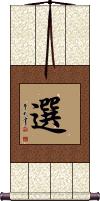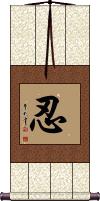Many custom options...
And formats...

Choice Choose Select in Chinese / Japanese...
Buy a Choice Choose Select calligraphy wall scroll here!
Personalize your custom “Choice Choose Select” project by clicking the button next to your favorite “Choice Choose Select” title below...
Choice / Choose / Select
This single Chinese character, old Korean Hanja, and Japanese Kanji means: to choose; to pick; to select; to elect; selection; choice; choosing; picking; election.
In Japanese, it can also be the male given name Hitoshi.
In the Buddhist context, it means to choose, or a myriad.
Patience / Perseverance
忍 contains the ideas of patience, equanimity, perseverance, forbearance, and endurance. Alone, this single character can be a bit ambiguous or flexible. It can also mean to endure, to bear, to put up with, or to conceal. If you want to simply decide what this character means to you within the general meaning but keep it a mystery to others, this is a good choice.
If you want to be more direct, you may want to choose one of our other selections that mean perseverance or patience (you will see this character within those larger words/phrases).
There is a secondary meaning in Japanese since this is the first character of the word ninja.![]() Note that when writing this as Kanji, Japanese will tend to write it in the form shown to the right. If you select our Japanese master calligrapher, please expect this Kanji form (yes, it's just one stroke that is slightly different in location, crossing another stroke in the Japanese Kanji form).
Note that when writing this as Kanji, Japanese will tend to write it in the form shown to the right. If you select our Japanese master calligrapher, please expect this Kanji form (yes, it's just one stroke that is slightly different in location, crossing another stroke in the Japanese Kanji form).
See Also: Perseverance | Patience | Tenacious
Not the results for Choice Choose Select that you were looking for?
Below are some entries from our dictionary that may match your Choice Choose Select search...
| Characters If shown, 2nd row is Simp. Chinese |
Pronunciation Romanization |
Simple Dictionary Definition |
選 选 see styles |
xuǎn xuan3 hsüan hitoshi ひとし |
More info & calligraphy: Choice / Choose / Select(n,n-suf) selection; choice; choosing; picking; election; (male given name) Hitoshi To choose; a myriad. |
選擇 选择 see styles |
xuǎn zé xuan3 ze2 hsüan tse senchaku |
to select; to pick; choice; option; alternative To choose, select. |
The following table may be helpful for those studying Chinese or Japanese...
| Title | Characters | Romaji (Romanized Japanese) | Various forms of Romanized Chinese | |
| Choice Choose Select | 選 选 | sen | xuǎn / xuan3 / xuan | hsüan |
| Patience Perseverance | 忍 | nin | rěn / ren3 / ren | jen |
| In some entries above you will see that characters have different versions above and below a line. In these cases, the characters above the line are Traditional Chinese, while the ones below are Simplified Chinese. | ||||
Successful Chinese Character and Japanese Kanji calligraphy searches within the last few hours...





